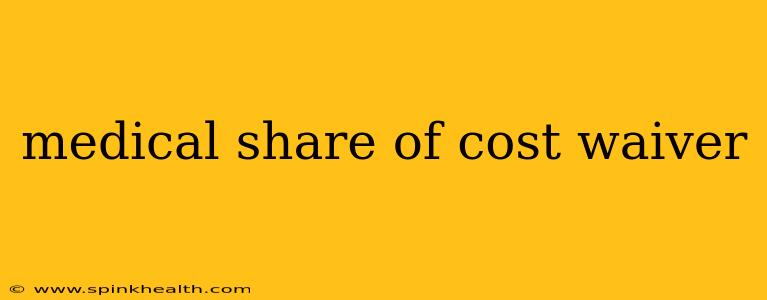Navigating the Maze of Medical Cost-Sharing Waivers: A Patient's Story
Let's be honest, healthcare costs can be terrifying. The bills, the deductibles, the co-pays – it's enough to make anyone's head spin. That's why understanding medical cost-sharing waivers is crucial. This isn't just about jargon; it's about your financial well-being and access to essential care. This article will unravel the complexities of these waivers, drawing on real-life experiences and expert knowledge.
Imagine Sarah, a single mother working two jobs to make ends meet. A sudden illness landed her in the hospital, leaving her with a mountain of medical bills she simply couldn't afford. She was overwhelmed, scared, and unsure where to turn. Then, she discovered the possibility of a medical cost-sharing waiver. This story, though fictionalized, represents the struggles many face, highlighting the importance of understanding these waivers.
What is a Medical Cost-Sharing Waiver?
A medical cost-sharing waiver is essentially a reduction or elimination of the out-of-pocket expenses associated with your healthcare. This can include deductibles, co-pays, and co-insurance. These waivers aren't a universal entitlement; they're typically offered through specific programs, based on financial need, or as part of charitable initiatives by hospitals or healthcare providers.
Think of it as a lifeline for individuals and families facing financial hardship due to medical expenses. It bridges the gap between unaffordable care and the ability to receive necessary treatment.
Who Qualifies for a Medical Cost-Sharing Waiver?
This is a crucial question, and the answer varies greatly. There's no single, universal eligibility criteria. Qualification often depends on factors like:
- Income level: Many waivers are tied to income guidelines, often based on federal poverty levels.
- Insurance status: Some waivers are specifically designed for uninsured or underinsured individuals.
- Type of medical service: Certain programs might offer waivers for specific conditions or treatments.
- Hospital or provider policies: Each hospital or healthcare system might have its own unique waiver program with its own set of rules and requirements.
Therefore, directly contacting the hospital's financial assistance department or your insurance provider is essential. They can guide you through the process and provide specific information about your eligibility.
How Can I Apply for a Medical Cost-Sharing Waiver?
The application process also differs depending on the program and provider. Generally, you'll need to provide documentation such as:
- Proof of income: Pay stubs, tax returns, or other income verification documents.
- Medical bills: Detailed statements outlining your medical expenses.
- Identification: Driver's license, passport, or other official identification.
It's crucial to thoroughly read and understand all instructions and submit a complete application to avoid delays.
What if I'm Denied a Medical Cost-Sharing Waiver?
Rejection doesn't necessarily mean the end of the road. You might have options for appealing the decision, negotiating a payment plan, or exploring other financial assistance programs. Don't hesitate to seek guidance from patient advocates or non-profit organizations that specialize in assisting individuals facing healthcare financial burdens. Persistence is key.
Are there other forms of financial assistance for medical bills?
Absolutely! Besides waivers, explore options like:
- Hospital financial assistance programs: Many hospitals have their own financial assistance programs, regardless of insurance status.
- Government programs: Medicaid and CHIP (Children's Health Insurance Program) offer subsidized healthcare for low-income individuals and families.
- Charitable organizations: Numerous organizations provide financial assistance for medical expenses. Research local and national options.
Sarah's story, although fictional, serves as a reminder of the importance of understanding and utilizing available resources. The system can be confusing, but with perseverance and knowledge, navigating it becomes more manageable. Don't hesitate to seek help; numerous resources are available to guide you through the process. Remember, access to healthcare is a right, and navigating financial obstacles shouldn't prevent you from receiving the care you need.

